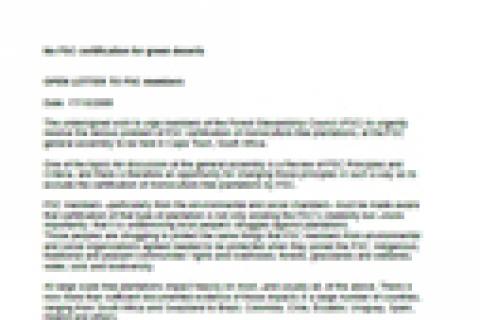The Subsidiary Body on Scientific, Technical and Technological Advice (SBSSTA) of the Convention on Biological Diversity (CBD), will hold its thirteenth meeting in Rome from 18 to 22 February 2008.
In the meeting’s agenda there are two items of extreme importance for WRM’s concerns: forest biodiversity and invasive alien species. Though they will be treated separately (the former by the full meeting and the latter by a working group), we believe that they are inextricably linked.
Other information
The young indigenous Mapuche leader, Patricia Troncoso has been on a hunger strike since 10 October 2007. She was given a prison sentence of 10 years and a day, accused of terrorist arson at the Poluco Pidenco property. This fire took place in December 2001 and the alleged perpetrators were tried, in the presence of “faceless witnesses” (that is to say, anonymous witnesses), under the Anti-terrorist Law created during the military dictatorship.
Indonesia, a leading producer of palm oil, reached an output of 16 million tonnes in 2006, having tripled the area of land under oil palm plantation between 1995 and 2005.
The United States is legendary for our ability to consume. Though we have the third largest population in the world far behind China and India, we consume more than any other nation in the world. This is no different when it comes to paper; we leave the rest of the world behind with the average American consuming 300 kg of paper per year. For context, the United Nations estimates that 30-40 kilos is the minimum needed to meet basic literacy and communication needs.
In last month WRM bulletin Nº 125, and linked to the 12th Conference of the Parties to the United Nations Framework Convention on Climate Change held in Bali, Indonesia, in December 2007, we warned about some decisions of the Clean Development Mechanism (CDM) Executive Board that might attract more tree plantation projects to the CDM –such as the removal of restrictions that prevent providing a perverse incentive to cut down forests to replace them with CDM sponsored monocultures, and theincrease of the size of tree planting projects that can apply to the CDM under simplified procedures and
The Summit of Communities Criminalized for Defending Nature was held last November in Quito, Ecuador. Criminalization is part of a strategy aimed at silencing any protest against the extractive activities of transnational corporations within Ecuadorian frontiers. It would seem that the next accused could be anyone. It is sufficient to raise your voice against the irrationality of global economy.
India's Minister of Tribal Affairs promised on 7.12.2007 to the Indian Parliament that the Scheduled Tribes and Other Forest Dwellers (Forest Rights) Act 2006 which the parliament approved a year ago, will be notified and implemented from 1.1.2008 onwards.
Old proposals of damming the Lower Mekong River were revived recently. According to press releases from the Thailand-based NGO TERRA, the governments of Lao PDR, Cambodia and Thailand have granted permission to Thai, Malaysian and Chinese companies, to conduct feasibility studies for up to six large hydro dams on the lower Mekong. Ten years ago the projects had been dismissed for their huge cost and potential environmental damage.
The National Legislative Assembly (NLA), set up after the military coup in Thailand last year and due to be disbanded following the general election on 23 December, has, in its dying breaths, approved the long awaited Community Forest Bill. Rather than consolidating the constitutional rights of all communities to manage their forest areas however, the NLA chose instead to exclude the rights of communities who are living outside the “conservation zones” to take part in forest management.
With the ideological discourse of big capital masquerading as sustainable development and as saviours of the poor, the pulp giants advance on the State of Rio Grande do Sul. With their capital they finance electoral campaigns, pay for misleading advertising and twist public power around their little fingers.
The Government of the State of Bahia, through the Centre for Environmental Resources, (CRA) held a seminar on 7 and 8 November with the purpose of “initiating a process of discussion and reflection on the environmental, social and economic prospects of eucalyptus plantations in the South and Extreme South of the State, taking a territorial approach as a basis, centring on the construction and consolidation of public policies for the region.” This event represented the continuity of a process of discussion launched in June this year by the CRA, seeking participative and negotiated solutions
In order for vast extensions of industrial plantations to be viable in Brasil direct interactions where established between the government, companies, banks, universities, media, as well as with international and financial institutions, producers and buyers. A broad political orchestration resulted in the creation of a number of mechanisms related to legal, taxation, financial, technical, scientific, agrarian and logistic support. In the same manner articulations opposing those policies increased as monocultures expanded.

